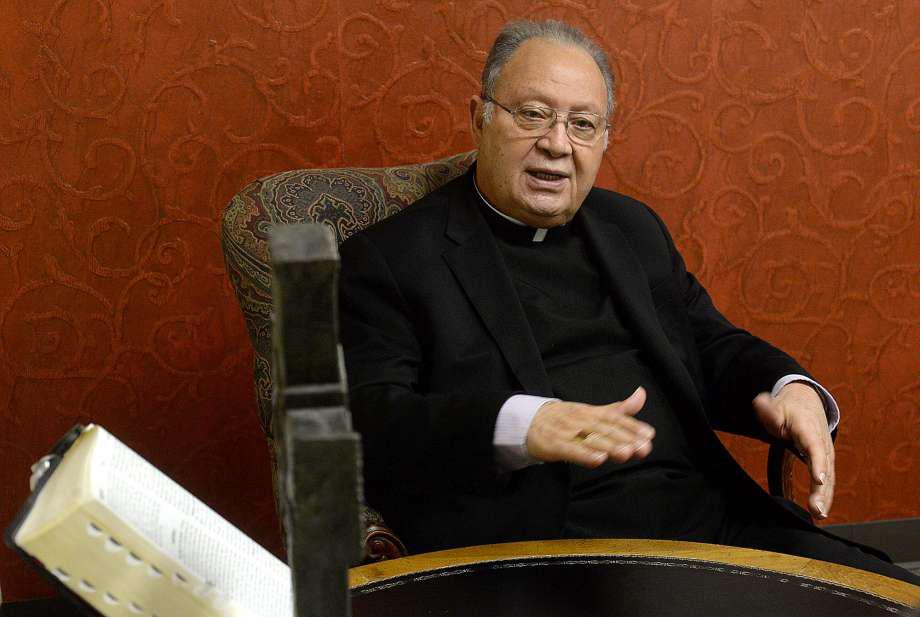|
Bishop reiterates sexual abuse by priests was criminal conduct
By Kaitlin Bain
[with video] Bishop Curtis Guillory has reaffirmed the Diocese of Beaumont’s position regarding sexual abuses by members of the clergy after a statement from a pastor this weekend that questioned the criminal nature of the acts. “Any act of sexual abuse of a minor is a heinous crime and it is a sin,” Guillory said, echoing his public letter of apology issued Thursday. “It’s a grave sin.” The bishop said he spoke with Monsignor William Manager on Monday morning regarding comments during a Saturday service, during which. Manger said the small number of clergy members arrested for sexual acts tells him what they did was not to “an intense criminal standard.” Guillory said Manger corrected the statement during Sunday’s services. Manger also told the Enterprise on Sunday he shouldn’t have brought up the issue and wasn’t clear on the offenses that 13 local clergy members were said to have committed. Their names were made public as part of a statewide counting of “credibly accused” priests for actions committed over the decades. Guillory said he does not expect Manger to address the issue further and no disciplinary action will be taken. However, the bishop said he’s asked members of the clergy and staff in the nine-county diocese to be “very sensitive to the victims.” “Words to them or a conversations with them should always be one of healing and sensitivity,” he said. Marci Hamilton, a University of Pennsylvania law professor and founder and CEO of the advocacy group Child USA, said it is especially important to consider how these acts, and statements about them, are interpreted by children involved. “For children who are in the dark on these issues and don’t understand what’s being discussed, what they may hear from (statements like Manger’s) is that something terrible that happened to them wasn’t a crime,” said Hamilton, whose group has lobbied for reforms to the limitations rules in child sex abuse cases. “It’s a message to not report it and keep it a secret.” The statements also fail to acknowledge other reasons someone wouldn’t face criminal charges aside from the seriousness of the act, experts said. Oftentimes, people don’t face charges or arrest as the result of the sexual abuse of a child because the statute of limitations expires before the victim feels comfortable coming forward, said Arizona State University university professor of political science Carolyn Warner. Warner also has studied Catholic institutions. Children can be dissuaded from reporting for myriad reasons including the trauma of the events, confusion of what actually took place and belief that priests are “basically God on Earth — a very strong authority figure,” she said. They also could avoid criminal prosecution if the local prosecutor or police don’t think there’s enough evidence to convince a jury of the crime, among other reasons. “The fact that someone didn’t face criminal charges … doesn’t mean that they didn’t do something horrendous,” Warner said. Some teachings of the Catholic Church can make it challenging for clergy members to see the acts through a lens of punishment. Warner says the canon law of the church, which sets the legal principles made and enforced by the church, focuses more on the sinner than the victim of the sin. “These procedures stress being forgiving and allowing multiple second chances,” she said. “The stress in Catholic theology is all about the sinner. It doesn’t include information about what to do for the victim of the sinner.” As a result, bishops in the past were almost compelled to allow clergy members who seemed repentant and who were trying to get help to come back to the church. “To the outside, it looks like they’re privileging the priest over the victim,” she said. “But again, canon law is very focused on the person who’s done something wrong and not the person who was subject to the child sex abuse.” The difference between the church and society at large can be even more obvious when many people who operate under Bishops’ authority rarely mix with “ordinary people” and don’t often realize the approaches of the church aren’t commonly recognized to the rest of society. Being more open about these procedures with parishioners could help give outsiders a look into the reason the Catholic Church has operated in such a way that seems to be protecting members of the clergy for so long. It also would give Catholics and opportunity to “demand more” from priests and bishops moving forward, Warner said. Contact: kaitlin.bain@beaumontenterprise.com
|
.
Any original material on these pages is copyright © BishopAccountability.org 2004. Reproduce freely with attribution.
